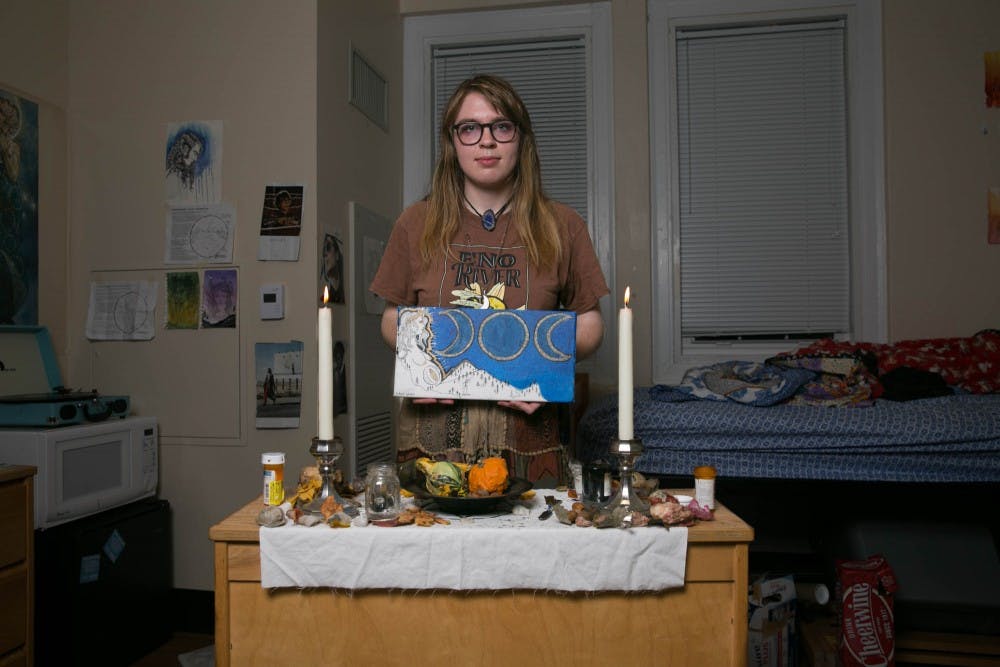Between 1 and 1.5 million people say they practice Wicca or Paganism in the United States, compared with 8,000 Wiccans in 1990, according to the Catholic News Agency, making this one of the fastest growing religions in the country. Wicca was declared as an official religion in the US in 1986.
Paganism, and more specifically witchcraft, may not be obvious because Pagans often fear external judgment. Furthermore, witches don’t perform magic in front of others who are not believers.
“This isn’t a small percentage of fringe weirdos,” Morris said of the Wiccan population.
There are three covens, or groups of Pagans, in Chapel Hill. Morris is part of two of these covens where she leads worships and helps foster spirituality through community.
“Being in a coven can be quite intimate,” Morris said.
Paganism and Wicca are also here on campus for students who double as witches.
Sophomore Emily Lewis converted to Wicca this past summer and is already incorporating magic and spirituality into her regular schedule. Lewis said many rituals include burning herbs and candles, and using crystals to “clear out negative vibes."
Magic is especially prevalent on Halloween, or Samhain, as known by Pagans. On this day, the veil between this world and the spirit world is thought to be the thinnest. Samhain is one of the eight Sabbats, or holidays, that correlate to the wheel of the year.
Though Halloween commercializes witches in a green and eerie light, many Wiccans appreciate the holiday for normalizing witches, at least temporarily.
“Some of us joke that this is the time of the year that we can buy our supplies at the grocery store — cinnamon brooms, black candles, glittery skulls and even a stereotypical witch’s hat,” Morris said.
Beyond the stereotypes surrounding the holiday, witches aim to give the public a greater sense of what witchcraft is truly about.
“It’s a time when people remember that there are real witches out there, and it’s a chance for us to speak out and be open and spread some education and insight,” Morris said.
To get the day's news and headlines in your inbox each morning, sign up for our email newsletters.
Education is a main goal for MagikCraft founder and owner Lynn Swain. Swain is a seventh generation witch who said she learned to read tarot cards before learning to walk.
MagikCraft, located in Durham, sells witchcraft items and offers workshops to people of many faiths, including Buddhists, HooDoos, Wiccans and many others.
The store is a hub for Swain to teach many different workshops on Pagan beliefs from international angles, as Swain lived abroad in England. Swain also teaches people how to do their own readings.
“I believe every single human has psychic abilities,” Swain said.
Swain also sells a specialty item that cannot be replicated at Walmart — spells.
Spells must be used carefully due to the Three-Fold Law, which states that energy one puts into the earth shall be returned three times, Lewis said.
College students and young adults make up about 50 percent of the customers at MagikCraft, and Swain is excited about the recent rise in Paganism.
“When I came back to America and said I was a witch, people flipped out,” Swain said. “But the culture has changed in the last five to six years, and more people are converting.”
Roz Fulton, the founder of the Pagan Parents of the Triangle, who is married to a member of the Daily Tar Heel's editorial board, is also teaching Paganism to young children in the area. This group acts as a Sunday school for young children to learn about Paganism and to celebrate sabbats as a community.
Part of what makes Pagan religions appealing to many is that they are welcoming of other beliefs and the diversity of faiths, Swain said.
“No matter what spiritual path you are on, you can believe in something outside yourself,” Swain said. “You don’t need to be defined by your family, friends, government, country or job.”
For UNC alum Cameron Manning, 24, a spiritual experience and ability to perform magic is central to a sense of power over her identity and surroundings.
“When we are attuned to our true will and higher purpose and goal in life, we are able to manifest all of that which we desire,” Manning said.
Franklin Street on Halloween will undoubtedly feature dozens of witches — some with green faces, bumpy noses and black capes, like the haggard old women Disney has concocted — but there will also be real witches roaming the streets.
"Yes, witches exist," Morris said. "We have always existed, and we're not going anywhere."
arts@dailytarheel.com



